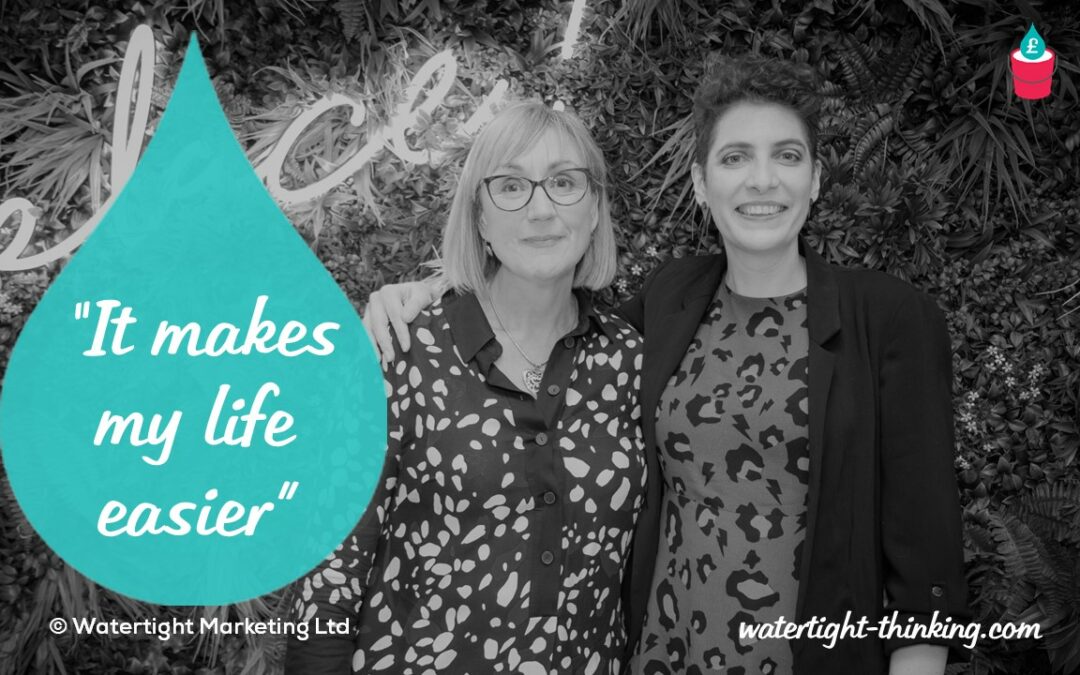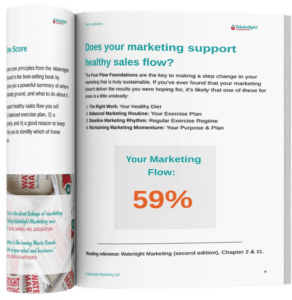Reading Time: 12 Minutes
“It makes such a difference that the senior leadership team have a good understanding of what marketing is and what they can expect from it.” We talked to Melanie Osborne, Marketing Director of Nviro about her experience of working with, using and applying Watertight Thinking. Interview by Rachael Wheatley, Watertight Business Thinking.
Rachael Wheatley: Thank you for joining me, Melanie. It’s a real pleasure to speak to you. Let’s start with a question about how Watertight changed your approach to marketing.
Melanie Osborne: Two things. The first is that the whole board is on board with it. It makes such a difference that the senior leadership team have a good understanding of what marketing is and what they can expect from it. The second is looking at the whole thing as a journey that can be re-visited, I think is really useful. As a marketer, you rush around doing a lot around awareness and interest, possibly get into evaluation stage, and then you step away. Businesses I’ve worked in before would expect you to step away at that point. Often marketing departments are set up to deal with awareness activities, but you haven’t got anybody that looks at the journey further down.
Rachael Wheatley: So, you’re sometimes leaving sales people or customer service people to their own devices?
Melanie Osborne: Yes, you just kind of throw it over don’t you? We’ve just done this spring/summer campaign, which we’ve built as a full-on journey, all the way through to loyalty. And we can use that model again and again, just changing the content, which makes it faster and more responsive, because you’ve got a journey already mapped out.
And I do think: what is the point of the awareness and interest activities if you get them to onboarding and it all falls apart? That’s something we’re working to improve. The fact that the whole business is focused on it as a journey makes it a lot easier for us to help and have an impact on the stages of the journey where there are gaps. Even though these are mainly delivered by other teams, we can work with them to give them the marketing tools they need.
Rachael Wheatley: And because you’ve taken the time to get everyone on board, they know what you’re talking about and referring to. You have that common language. The conversation we had about account management, it felt like others in the business now understand why it’s so important because it’s seen in the context of that whole customer journey.
Melanie Osborne: Yes, definitely. Account management is going to be the next big focus, including making sure that the right people have got the relevant skills.
Rachael Wheatley: As an experienced marketer, what influence did Watertight have for you personally?
Melanie Osborne: For me, the structure really helps and trying to get it relevant to the senior team so marketing wasn’t just seen as a kind of add-on or the pink fluffy stuff! Having a structure that sees the journey all the way through is probably the most important thing. It’s really easy to get sidetracked on the shiny new things, but actually, you can be wasting your time. My background has always been brand, identity and consistency; some of that, you do anyway. What Watertight changes is what people expect from marketing.
Rachael Wheatley: So it’s easier to make the case for marketing being more than lead generation or coloring-in. Because you’re pointing to the structure you want to follow and you can explain why you’re doing what you’re doing.
Melanie Osborne: And also do not get distracted by awareness and interest, because you know that you’ve got a process. The process and the structure of Watertight is really helpful. I was always aware of it being a journey, but not as much and not as clearly.
Rachael Wheatley: The next question is about how you’ve applied the thinking or frameworks in your job. Can you give us a couple of examples?
Melanie Osborne: Employee onboarding is a massive thing for us. And that’s something that we’ve really changed and review regularly. For marketing to be involved in that is really unusual and we take it so seriously. So that’s been a massive change. In its priority within the business and its focus and that whole journey. The employee onboarding, engagement, recruitment, and we’re now working back up through the funnels and filters and into the taps as relates to the employee journey. We’ve got our own onboarding structure now; we’ve got a two day induction where they cover off a number of things. Now we’re starting to move up to look at their experience in between applying and being offered the job. It’s a more thoughtful approach, rather than how marketing has traditionally operated where you say, oh, I can do that. I can get more people to apply.
Rachael Wheatley: What challenges or problems do you think Watertight helps to solve?
Melanie Osborne: The framing of marketing. I mean, we’ve been using your definition a lot recently and that’s really useful. Because some people thought I’d come into the business and suddenly we’d have loads of new clients. And then when you don’t, it’s like, oh, what are you doing? By framing it in the Watertight way, it explains to people in a more understandable way, what it is that we’re doing. I also think some of your sayings are great. The quote “marketing shines a light on the truth” is something that I say on a daily basis. That’s really hit through in that marketing aren’t just going to make it all wonderful, if it’s not there. To some extent, in previous roles, you just do that, you spin it.
Rachael Wheatley: Which makes marketing manipulative, doesn’t it? That feels completely wrong and isn’t what good marketing should be.
Melanie Osborne: Yes, but if you’re judged on the number of leads, number of enquiries, number of new customers, that’s what you do, you skim over the stuff that doesn’t work so well. But if you’re judged on keeping customers through to loyalty, then you’ve got to address the marketing that supports all the stages of their decision.
Rachael Wheatley: You’re talking there in terms of the challenge of how we position marketing internally, and get the message over that it’s broader, deeper, wider than most people think?
Melanie Osborne: Yes, I think that’s right.
Rachael Wheatley: What do you feel Watertight has enabled or equipped you and your team to do?
Melanie Osborne: Increasing our influence in terms of working with different areas of the business to improve systems and processes. I was probably quite focused before on marketing communications in terms of getting the message out whereas using Watertight makes it much more integrated into everything, into invoicing and KPI reporting, account management, service standards, everything,
Rachael Wheatley: So, helping make marketing more central in the business?
Melanie Osborne: Yes, absolutely and it probably makes it more interesting for the team.
Rachael Wheatley: A bigger role, a more impactful role?
Melanie Osborne: Yes and you can see the value that it’s delivering and how we support the business objectives. And also how other people are then using what we produce. It’s a physio session, rather than a sticking plaster. It goes much deeper into the business.
Rachael Wheatley: How have you extended Watertight’s use and approach beyond the marketing team? You’ve obviously talked about employer marketing, which involves the HR team. How have you used it beyond that?
Melanie Osborne: When we do an internal comms campaign. We’ve just launched a salary sacrifice scheme. We built that up, because we want people to take advantage of the tax benefit of it. We’ve looked at how we launched it in terms of moving people through the stages of the journey. So we started with lots of smaller steps, using Watertight’s Time Triangle approach, a little bit of time, then a bit more, and a bit more, all the way through.
With clients, too. With one client we are in the process of onboarding them on to a new contract, having retained them through a re-tender. We’re taking them back through everything that we do, and making them aware of all the different services that we offer. Whereas I think, pre-Watertight, we probably just went, yeah, we’ve won it right, crack on and let’s deliver it. The difference is, we’re now explaining and helping them to understand what we do and why we do it. It makes for a much stronger relationship.
Rachael Wheatley: That’s interesting, because I think that that helps to pave the way for your service team to deliver a great service. It means that they can then shine at what they do and marketing helps to take the weight.
Melanie Osborne: Using communication really helps take the pressure off the service team. With this client and the new contract, we very early on said it isn’t going to be perfect overnight. We set their expectations and that makes a huge difference.
Rachael Wheatley: This next question may be difficult to answer, because when you started your job, we were already working with Nviro, and Brian the MD was already bought into Watertight thinking, and some others already had some kind of exposure to us. If you had come into a situation where that wasn’t true, to what extent do you think Watertight would still have been useful for you?
Melanie Osborne: It’s much more useful when the MD or the owner is committed to it. And as a marketer, having that structure makes your life easier. Without that, without the MD being committed to it, it’s more likely you’d go into a new role and carry on doing what you’ve always done. In my previous role, I was trying, but not getting much traction. For me, Watertight was really useful as reassurance that at least I was doing the right thing, even if I wasn’t able to influence up too much.
Rachael Wheatley: So, what impact do you think it’s had on the wider business?
Melanie Osborne: I think people understand marketing more. We’re currently working through a series of lunch and learns, taking them through the thinking, one really slow step at a time, and that’s really helping. We literally took it back to asking them to think of something they’d bought recently, so taking them through a customer journey they’d made. How did you know you needed it? Why did you need it? What was your driver? Was it a crisis purchase? Then we’ve gone, ok, this month, we’re going to talk about how do we raise awareness? How do we generate interest? What are the things that we’ve created that would help you do that. What are the things that you saw when you made that purchase? Really taking it back to basics.
Rachael Wheatley: And that’s landed well?
Melanie Osborne: Very well, because people now realise it’s not complicated and that they do have a contribution to make to marketing.


